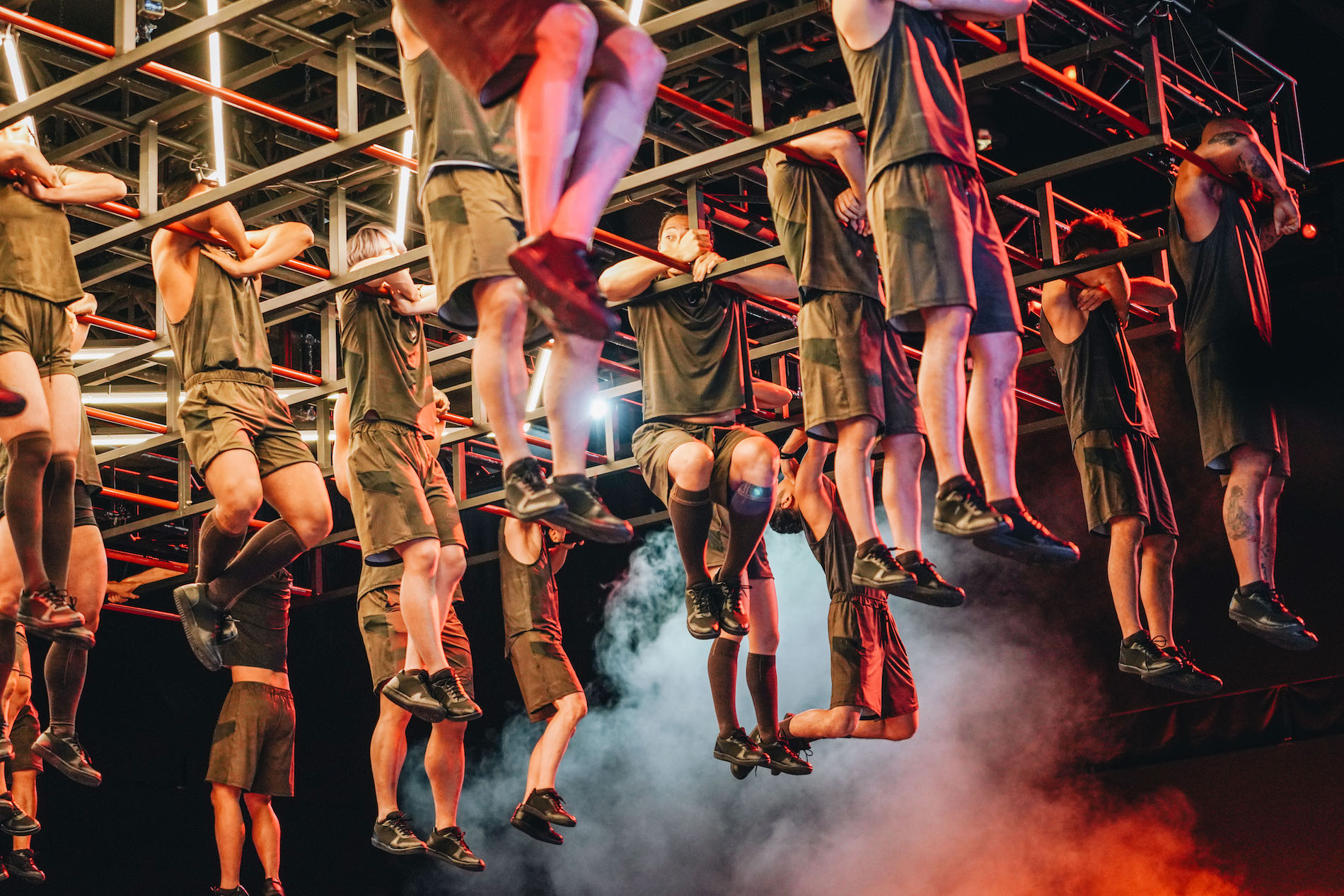There are plenty of points across the nine episodes of “Physical 100” where a contestant claims that they’re “fighting for their life.” That’s more a cliche than willful ignorance, but it does connect with the reasons why this Netflix show probably first popped on people’s radars and why it became a hit on its own merits.
Sure, a handful of moments early in the show draft a tiny bit off “Squid Game.” There’s the idea of winnowing a large group down to one winner (though, that’s a concept not exclusive to hit fictional political allegories). At one point, the contestants have to stand on numbered tiles (something that leads one of them to reference that other show directly.) Both are Korean-produced Netflix shows with nine-episode first seasons, but the two shows have far more differences than similarities.
“Physical 100” bills itself as a “search to find the most perfect physique.” On its face, that seems like a fundamentally foolish idea, filled with so many variables and qualifiers that it almost stops that search before it starts (or at least invalidates it). The biggest trick of this Netflix competition show, which just released its final episode this week, is that it gets closer to a definitive answer than you might assume. It starts by assembling a contestant base that includes Olympians, social media phenoms, CrossFit legends, bodybuilders, and performers.
It also does it mainly by keeping the design and execution of these elimination “quests” as elegant and simple as possible. With the possible exception of two big team events — designed to give people with different skill sets a chance to contribute alongside the people with the largest delts — these competitions happen in bite-sized arenas where the details are more variables than affect. Early one-on-one keepaway matches have courses with tiny wading pools or a rope wall. No one detail is designed to artificially rob someone of their advantages. They’re obstacles designed to put a slight barrier between a championship and brute force.

“Physical 100”
Whether drawing on millennia-old stories or playground activities, the best parts of “Physical 100” don’t require a lot of explanation. There’s the implied message that you probably shouldn’t be lifting 200-pound boulders to impress your friends. If you could, though, you wouldn’t need to travel to a custom-built warehouse-sized sound stage to do it. It reduces the idea of strength down to its basic components (hanging, running, climbing, etc.) without just relying on strongman competition-style spectacles. Not that doing something like pulling a plane doesn’t require strategic skill, but size works against some of these “Physical 100” elimination stages.
That need to not only have strength but know how to use it is an interesting comparison with something like “The Climb,” the HBO Max series from earlier this year. “The Climb” had a similar hook based minimally on a preexisting phenomenon (“What if ‘Free Solo’ but competitive?”) and thrived based on the dynamic of its competitors. Similarly, all the tension in “Physical 100” that comes from building teams or choosing opponents is all designed to say more about the person making those decisions instead of merely create manufactured drama. Strength and pride here are completely intertwined, both in the actual events and how the other contestants offer their support from within shouting distance after they’re out of the running.
It’s all in service of creating a different kind of underdog. If anything, “Physical 100” unites all these competitors in a single trait: the belief that they can turn their prowess and endurance into a $200,000+ prize. Yet there are still those who, like “The Climb” too, are competing for underrepresented groups beyond themselves. Promoting less-popular sports and professions become just as much a motivating factor as those cash winnings. A self-trained car dealer can outlast MMA fighters or special ops military personnel by virtue of knowing how to use what’s at their disposal.

“Physical 100” Pool
A competition show doesn’t need to defy death itself in order to be interesting. With reports of Netflix’s actual “Squid Game”-inspired reality show having entered ethically murky waters, “Physical 100” has more on its mind than cashing in on a sensation. Without a host or a narrator, there’s a complicated power dynamic within the show. Who gets the right to be a team leader is sometimes chosen through ability, sometimes through circumstance, and sometimes during popular vote. These challenges, in their design and execution, are often made to reward multiple types of strategies and give alternatives for people not equipped to travel down the most obvious path.
All the players in “Physical 100” have a plaster mold of their torso to represent them throughout the competition. Eliminated players, whether in the process of failing a challenge or after a loss, have to shatter that mold. Seeing how people respond to having to destroy their own likeness is a social experiment in itself. Some take out their frustration with a hammer. Others are so dejected, they can hardly put in an effort. One guy even punches his way through it.
If underdog stories are about elevating unlikely champions, “Physical 100” is an overwhelming exercise in humility. 99 of these people who have spent a majority of their lives being lauded for their watermelon-sized thighs or sculpted neck muscles or superhuman flexibility have to face the idea that they can be beaten. So in a way, they are fighting for their lives. But it doesn’t have to be life and death to be compelling.
“Physical 100” is now available to stream on Netflix.
Sure, a handful of moments early in the show draft a tiny bit off “Squid Game.” There’s the idea of winnowing a large group down to one winner (though, that’s a concept not exclusive to hit fictional political allegories). At one point, the contestants have to stand on numbered tiles (something that leads one of them to reference that other show directly.) Both are Korean-produced Netflix shows with nine-episode first seasons, but the two shows have far more differences than similarities.
“Physical 100” bills itself as a “search to find the most perfect physique.” On its face, that seems like a fundamentally foolish idea, filled with so many variables and qualifiers that it almost stops that search before it starts (or at least invalidates it). The biggest trick of this Netflix competition show, which just released its final episode this week, is that it gets closer to a definitive answer than you might assume. It starts by assembling a contestant base that includes Olympians, social media phenoms, CrossFit legends, bodybuilders, and performers.
It also does it mainly by keeping the design and execution of these elimination “quests” as elegant and simple as possible. With the possible exception of two big team events — designed to give people with different skill sets a chance to contribute alongside the people with the largest delts — these competitions happen in bite-sized arenas where the details are more variables than affect. Early one-on-one keepaway matches have courses with tiny wading pools or a rope wall. No one detail is designed to artificially rob someone of their advantages. They’re obstacles designed to put a slight barrier between a championship and brute force.

“Physical 100”
Whether drawing on millennia-old stories or playground activities, the best parts of “Physical 100” don’t require a lot of explanation. There’s the implied message that you probably shouldn’t be lifting 200-pound boulders to impress your friends. If you could, though, you wouldn’t need to travel to a custom-built warehouse-sized sound stage to do it. It reduces the idea of strength down to its basic components (hanging, running, climbing, etc.) without just relying on strongman competition-style spectacles. Not that doing something like pulling a plane doesn’t require strategic skill, but size works against some of these “Physical 100” elimination stages.
That need to not only have strength but know how to use it is an interesting comparison with something like “The Climb,” the HBO Max series from earlier this year. “The Climb” had a similar hook based minimally on a preexisting phenomenon (“What if ‘Free Solo’ but competitive?”) and thrived based on the dynamic of its competitors. Similarly, all the tension in “Physical 100” that comes from building teams or choosing opponents is all designed to say more about the person making those decisions instead of merely create manufactured drama. Strength and pride here are completely intertwined, both in the actual events and how the other contestants offer their support from within shouting distance after they’re out of the running.
It’s all in service of creating a different kind of underdog. If anything, “Physical 100” unites all these competitors in a single trait: the belief that they can turn their prowess and endurance into a $200,000+ prize. Yet there are still those who, like “The Climb” too, are competing for underrepresented groups beyond themselves. Promoting less-popular sports and professions become just as much a motivating factor as those cash winnings. A self-trained car dealer can outlast MMA fighters or special ops military personnel by virtue of knowing how to use what’s at their disposal.

“Physical 100” Pool
A competition show doesn’t need to defy death itself in order to be interesting. With reports of Netflix’s actual “Squid Game”-inspired reality show having entered ethically murky waters, “Physical 100” has more on its mind than cashing in on a sensation. Without a host or a narrator, there’s a complicated power dynamic within the show. Who gets the right to be a team leader is sometimes chosen through ability, sometimes through circumstance, and sometimes during popular vote. These challenges, in their design and execution, are often made to reward multiple types of strategies and give alternatives for people not equipped to travel down the most obvious path.
All the players in “Physical 100” have a plaster mold of their torso to represent them throughout the competition. Eliminated players, whether in the process of failing a challenge or after a loss, have to shatter that mold. Seeing how people respond to having to destroy their own likeness is a social experiment in itself. Some take out their frustration with a hammer. Others are so dejected, they can hardly put in an effort. One guy even punches his way through it.
If underdog stories are about elevating unlikely champions, “Physical 100” is an overwhelming exercise in humility. 99 of these people who have spent a majority of their lives being lauded for their watermelon-sized thighs or sculpted neck muscles or superhuman flexibility have to face the idea that they can be beaten. So in a way, they are fighting for their lives. But it doesn’t have to be life and death to be compelling.
“Physical 100” is now available to stream on Netflix.

